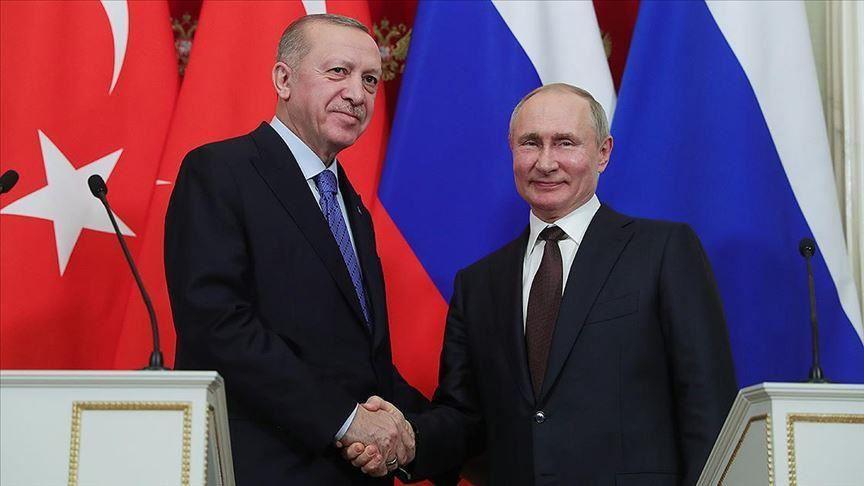
President Recep Tayyip Erdoğan has told Russian President Vladimir Putin that Turkey is in favor of a lasting solution to the Nagorno-Karabakh conflict amid ongoing clashes between Armenian and Azerbaijani troops.
The two spoke in a telephone conversation that took place for the first time since the tension in South Caucasus flared up in late September.
The two leaders exchanged views on the phone late Oct. 14 on a number of issues, including the Nagorno-Karabakh and Syrian conflicts, upon the Turkish side’s initiative.
“Stating that Armenia, which caused a new crisis by attacking Azerbaijani lands, was trying to make its nearly 30-year-old occupation permanent. President Erdoğan noted that Turkey, within the framework of its status in the Minsk Group and its bilateral relations, was in favor of a lasting solution to the issue,” read a brief statement issued by Turkey’s Communication Directorate after the conversation.
Turkey and Russia are both the members of the Minsk Group, while the latter is also among three co-chairs along with France and the U.S. assigned to resolve the Nagorno-Karabakh problem since the early 1990s.
Erdoğan criticized the three Minsk Group co-chairs for not taking concrete steps for the resolution of the problem that encouraged Armenia to prolong its occupation and make it a permanent one.
At a parliamentary address on Oct. 14, Erdoğan renewed his calls on the Minks Group to force Armenia to withdraw from the occupied Azerbaijani territories.
Putin concerned about foreign fighters
A statement issued by the Kremlin stressed that the two presidents have discussed in detail about the developments in the Nagorno-Karabakh zone.
“Both sides reaffirmed the importance of complying with the humanitarian truce that was agreed in Moscow on Oct. 10. Vladimir Putin and Recep Tayyip Erdoğan spoke in favor of stepping up the political process, in particular, based on the work of the [Organization for Security and Cooperation] OSCE’s Minsk Group,” it said.
Russia brokered a humanitarian ceasefire between the two warring sides starting from Oct. 11, but Armenia breached it through attacks on Azerbaijani residential settlements, including Ganja.
According to the statement, Putin has expressed serious concern over the involvement of Middle Eastern fighters in the military action, something which Erdoğan denied on Oct. 14.
“The leaders stressed the urgent need for joint efforts in order to cease the bloodshed and move to a peaceful settlement of the Nagorno-Karabakh problem as soon as possible. Hope was expressed that Turkey, as a member of the OSCE Minsk Group, would make a constructive contribution to de-escalating the conflict,” the Kremlin stated.
Momentum should be preserved in Syria
The two leaders discussed recent developments in Syria as well. Turkey and Russia, members of the Astana Group, have long been cooperating for the de-escalation in the war-torn country and facilitate the conditions for a political transition.
“President Erdoğan also underscored that the momentum gained in the political resolution process of the Syrian crisis should be preserved,” read Ankara’s statement on the matter.
Kremlin’s statement also cited the Ankara-Moscow partnership in regards to Syria and Libya. “The effectiveness of cooperation between Russia and Turkey was pointed out during the discussion of Syrian and Libyan affairs. The cooperation helped to stabilize the situation and move forward on the political and diplomatic tracks,” it underlined.
Fight against COVID-19
The Kremlin’s readout informed that Erdoğan and Putin have exchanged views on a number of bilateral issues, including the fight against the COVID-19 pandemic.
“The two presidents noted mutual interest in countering the coronavirus, including collaboration in developing and producing vaccines. Specialized agencies will be instructed accordingly,” it said. Both countries are exerting efforts to develop a vaccine against the coronavirus.